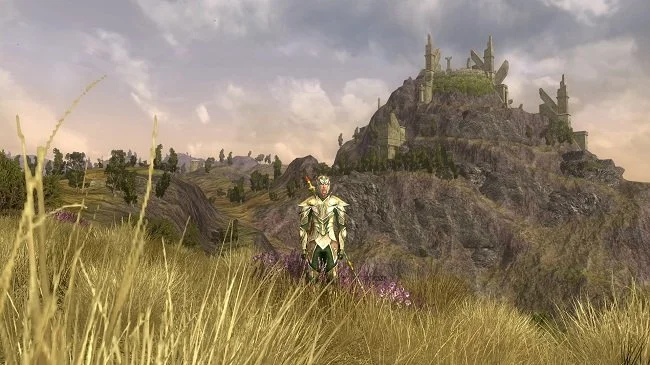LOTRO: Abandoned Game Mechanics and Systems Part 2
In the previous post, I focused upon several major game mechanics that were added to the MMORPG The Lord of the Rings Online with much pomp and ceremony, only to fall into abeyance shortly afterwards. I cited such examples as mounted combat, epic battles and skirmishes. Their fate may well have been due to player indifference or the fact that the mechanics were complicated to develop and expensive to maintain. In this follow-up article I would like to discuss some additional systems that are somewhat smaller in their scope and relevance, but have similarly been abandoned by the developer’s Turbine/Standing Stone Games over the lifecycle of the game. Some are ancient history within the context of the LOTRO. Others are far more recent and that is a point worth reflecting upon.
Destiny Points. All LOTRO players earn destiny points after they have reached level 10, by progressing through the game’s content. The current award is 200 destiny points per level. The currency can be spent on perks that enhance gameplay and levelling. For example, points can be spent on accelerated experience. Similarly they can be spent on a combat run speed, power and morale regeneration, hope, damage and mitigation buffs. However, only VIP players can spend destiny points on perks and this system has never been extended to free-to-play customers. Destiny points offered tangible benefits between 2007 and 2010 but when LOTRO went F2P, the system was sidelined in favour of store based perks. Furthermore, the revisions made to the games levelling curve also impacted upon their relevance. As the LOTRO level cap has grown, levelling per se has become a lot quicker in earlier parts of the game and destiny points are not really required. However, they are still quite useful if applied wisely, although nowadays the system is buried within the game’s UI.
Episodic Content. This is possibly one of the best ideas Turbine/Standing Stone Games have ever implemented. Continuous player engagement is always an issue for the MMORPG genre. The Ballad of Bingo Boffin addressed this by offering players a weekly episodic story that ran for an entire year. The first instalment was set at level 8 so the episodic content could be used to provide a weekly goal for levelling, if a player so wished. Alternatively players could play all episodes in one session if they wanted to, once they had been released and as long as they had reached the level of the final episode. The story was fun and cleverly revisited a lot of existing zones that players may not have necessarily revisited. The weekly release also generated excitement and reason to log into the game. Yet despite the success of this game mechanic it has not been utilised to a comparable extent since its initial release in 2015. A decision that is somewhat baffling.
Hobbies. Hobbies are a nice concept within the MMO genre. Something I’m sure Simon Quinlank would endorse. The idea of a non-combat based activity that can be progressed and developed over time is very appealing. Sometimes when playing a game such as LOTRO you just want some down time and to bask in the pleasant virtual sunshine. Hence hobbies were introduced to the game in 2008. The first one was fishing and sadly no further activities have been added in the ensuing 14 years. Furthermore fishing has been nerfed. Although it still yields prize fish that can be taken to the taxidermist and turned into trophies, the bait mechanic which improved critical chance has been removed. I miss the Red Wiggler bait.
Pipe-weed. For the Lore-master class in LOTRO, pipe-weed used to be an essential consumable that was required for any group content. Back in the early days of the game, the Lore-master skill Back from the Brink that can revive a downed player, was dependent on having a supply of pipe-weed. Perhaps that’s why the developer’s nerfed it and removed the dependency on actually having pipe-weed. Pipe-weed remains in the game as a farming item. The various varieties yield cosmetic smoke ring emotes but as a functional item it is now obsolete.
Class Trainers. When LOTRO was first released, as a player’s character progressed through the game, class skills were not automatically bestowed and added to the quickslot bar. Instead you received notification to visit a class trainer and you bought the skill that you now qualified for. If you didn’t have sufficient in-game gold, then you couldn’t buy the skill. Hence you had to exercise a degree of fiscal prudence. However, this system has now been removed from the game and skills are bestowed directly to your alt as you level. The class trainer NPCs are now just relics of this system with no real purpose.
Currencies. MMOs love multiple in-game currencies and LOTRO is no different. As you level your alts through content there are multiple reputations factions offering unique currencies that can be used to barter for level appropriate gear. And therein lies the rub. Once you out level a reputation faction its currency can offer you precious little. Hence it can be very frustrating to have a barter wallet full of useless currency that you’ve worked hard for. It’s a similar story with regard to seasonal festival tokens. At one point Turbine/SSG talked about creating a universal token system and phasing out all the niche currencies. Sadly this never happened and more than likely never will. LOTRO continuously undermines the effort players put into the game.




























